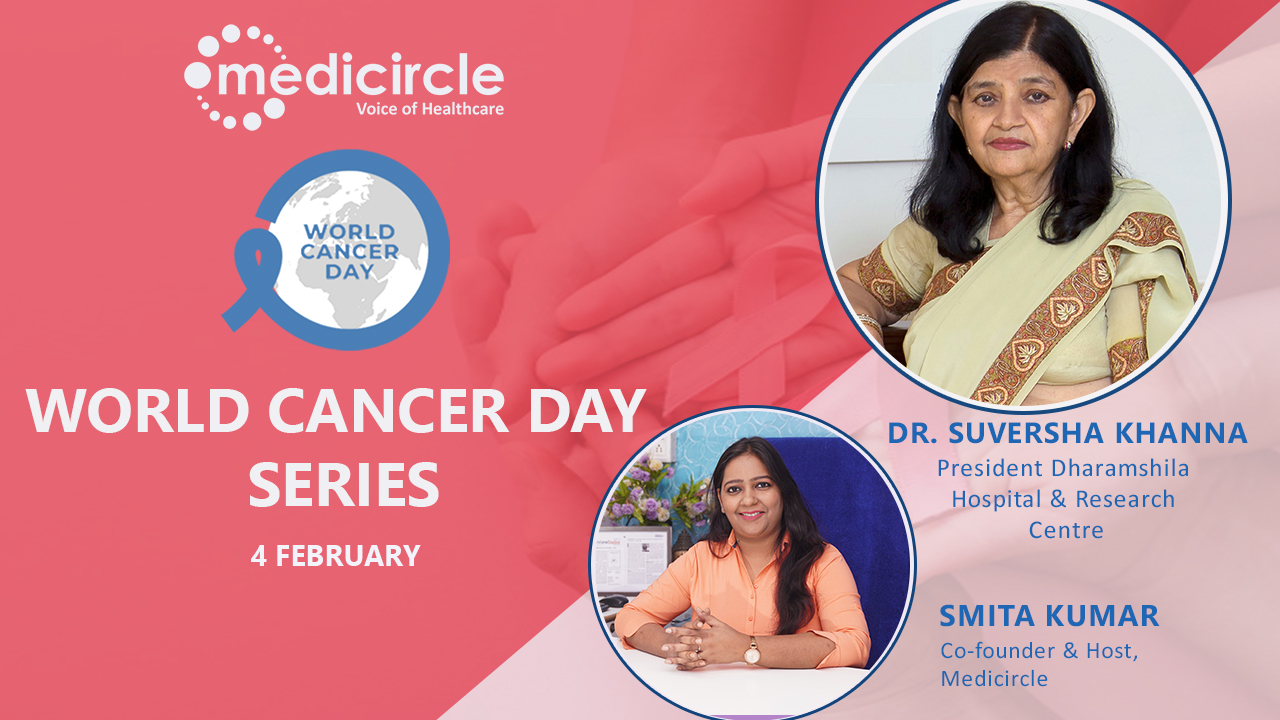More than 10 million people around the world die each year from cancer. Experts project cancer deaths to rise to 13 million by 2030 if we do not act now. There are more than 100 types of cancer, including breast cancer, skin cancer, lung cancer, colon cancer, prostate cancer, and lymphoma. World Cancer Day aims to save millions of preventable deaths each year by raising awareness and education about cancer.
Dr. Suversha Khanna is the President at Dharamshila Hospital & Research Centre. She is a certified assessor for the National Accreditation Board for Hospital and Health Care Provider (NABH). After actively practicing for 23 years, Dr. Suversha started an NGO in 1990 and Dharamshila Hospital and Research Centre in 1994 with a vision to fight and win the battle against cancer. From a humble beginning, DHRC is a pioneering Cancer Hospital in India now.
Dharamshila Narayana Superspeciality Hospital (A unit of Dharamshila Cancer Foundation And Research Centre) is a State-of-the-Art multispeciality hospital with world-class medical infrastructure and an Expert Team of highly skilled super specialists providing comprehensive medical care in several specialties including oncology, cardiology, neurology, urology, gastroenterology, and orthopedics.
Early detection can put cancer at bay
Dr. Khanna lists down the following measures to prevent cancer or fight it during the precancerous and stage1:
-
‘’Cancer of the cervix. All sexually active women above the age of 25 years should have an annual pap smear examination for detection of precancerous conditions. This gives a woman enough time to have children before the pre-cancer cells start turning into cancer cells. After which surgery can be done to remove the cervix.
-
Breast cancer. Women should do self-breast examinations. In this practice, any lump can be detected, and accordingly, treatment can be done by the doctors before it is too late.
-
Oral Cancer. For detecting oral cancer, one can do monthly self-examination, by examining the oral mucosa inside of their mouth. If there is a red, white, brown, blackish patch or bleeding from the gums it could be a precancerous stage and the patches can be removed by doctors.”
What triggers cancer
Dr. Khanna sheds light upon the following factors that trigger cancer:
- “Unhealthy lifestyle
- Living in a polluted environment, be it air, be it soil, be it water, all are badly polluted.
- Increase in infections that cause cancer like Hepatitis B, Hepatitis C, HIV, HPV
- Increase in life expectancy, we have more people living for more and more years which affects their immune system.” says Dr. Khanna
Change the mindset to alter the outcome
Dr.Khanna emphasizes the need to change mindsets to alter our course of life from unhealthy to healthy. She lists down following healthy lifestyle measures which are simple but life-changing:
- “No tobacco,
- No alcohol
- No multiple sexual partners
- A healthy diet consisting of whole grains, cereals, pulses, fresh vegetables, fresh fruits, nuts, etc.
- No processed food
- Avoid excess fat
- Avoid weight gain
- Be active
- Go for a Routine annual health check-up”
Secondary Prevention Measures
Dr. Khanna explains secondary prevention measures of cancer by mentioning, “Secondary prevention means even if cancer has started in my body today, it is not going to manifest tomorrow or day after and may take years to manifest it. That means I'm in a precancerous state.”
She lists down two significant preventive measures:
- “Monthly self-examination - 10% of the cancers can be detected by the person himself or herself by monthly self-examination
- Prompt diagnostic actions - Early screening and detection can help cancer patients to combat this disease.’’ she says.
Need for awareness amongst rural and uneducated people
Dr. Khanna observes that the educated and urban people are more aware of cancer and its prevention compared to those who live in rural areas and are uneducated. There is a need to reach out to such people and make them aware of the disease and the risk factors related to it.
(Edited by Faryal Siddiqui)

 Dr. Suversha Khanna, President, Dharamshila Hospital and Research Center emphasizes the need for a healthy lifestyle, preventive measures, early detection, and spreading awareness about cancer to the rural and uneducated population to bring down the occurrence of the disease.
Dr. Suversha Khanna, President, Dharamshila Hospital and Research Center emphasizes the need for a healthy lifestyle, preventive measures, early detection, and spreading awareness about cancer to the rural and uneducated population to bring down the occurrence of the disease.










.jpeg)




.jpeg)

.jpg)













